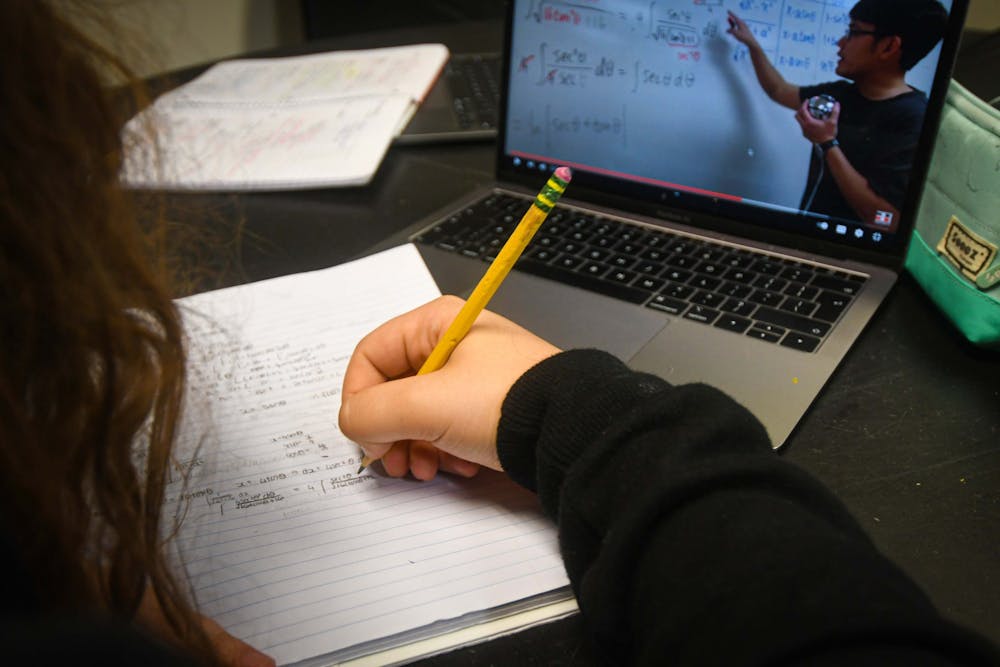
Bridge to Math co-hosted a study hall event for about 150 students on Oct. 20 with the Student Committee on Undergraduate Education as part of its first Education Week in two years.
The event was held in David Rittenhouse Laboratory from 5:15 p.m. to 7 p.m. to help students prepare for their Friday quiz the next day. Bridge to Math, formerly known as Bridge to Math 114, is a student-led initiative that started last year with the goal of acclimating incoming first years to math classes at Penn.
The study hall sessions are Bridge to Math's main events during the school year, and its website features pre-made MATH 1410 and 1400 notes, according to College junior and Director of Bridge to Math Iris Horng. The program also offers ways to use the material in order to fully grasp the concepts based on each student's level of background knowledge of calculus. Advice from previous students about the classes is also available on the website.
“A lot of freshmen come into Penn and maybe they haven’t taken math since junior year of high school. They’re a bit nervous about which math class to take and what it is like at Penn,” Horng said. “I created this program to help them get a sense of what information they want to review and also make them less anxious about starting.”
Six different rooms in DRL were packed with teaching assistants and students from MATH 1300, 1400, 1410, and 2400. Students had the ability to ask TAs questions about practice problems and about the upcoming quiz. TAs taught at the front of the room by using chalkboards to demonstrate sample problems, while students studied collaboratively.
Engineering junior and Director of Education for Bridge to Math Arnav Jhaveri said that “math at Penn can feel disorganized,” because “TAs use different teaching materials.”
He said that Bridge to Math is able to provide a “centralized system” by standardizing what students should study. The shift to college-level math is made easier by providing pre-recorded sessions from the Summer 2022 Program.
Since the inception of Bridge to Math last year, the number of events and students engaging with the club has increased. Bridge to Math hosted a three-day long Summer 2022 Program over Zoom to expose students to important material covered in MATH 1410 and MATH 1400.
The first day involved a question and answer session with past TAs and current students in the classes, the second day focused specifically on MATH 1410, and the third day focused on MATH 1400.
TAs led a panel with Mathematics professor Robert Ghrist to talk about math classes and the department in general. Horng and Janine Remillard, a professor from Penn's Graduate School of Education spearheaded a 30-minute workshop titled “Explore your feelings about Math" to help students relieve the stress they had before entering campus.
Last year, only one to two TAs helped with each introductory level class for Bridge to Math. This year, over 10 TAs are participating in the club.
Bridge to Math’s study hall was one of many events during SCUE’s Education week. SCUE recently wrote an opinion column in The Daily Pennsylvanian describing the week as an opportunity to “reflect on what undergraduate education means to you and speak up about what you want to see grow and change in your education at Penn.”
College sophomore and Vice Director of Bridge to Math, Ananya Varshneya, said that she took MATH 1410 in the past, so she knows what to expect and the kind of stress that comes with taking the class.
“Basically, we are trying to demystify the math experience and make it something that every student can navigate comfortably and easily,” Varshneya said. “And that’s why Bridge to Math comes in and tries to serve as a mentor and helping hand for the students.”
Bridge to Math hopes to continue these study halls and expand their events throughout the year, Horng said. She hopes to increase the number of study halls throughout the semester but knows that will require more funding.
“Previously we only did it once a semester, last fall and last spring. This year, I’m hoping to do it twice, depending on funding that we can get,” she said.
Horng hopes that the program will expand past introductory math classes and continue to grow after she graduates.
“I’m definitely looking to expand this program with more board members. I hope this program really continues even after [I graduate],” she said.
The Daily Pennsylvanian is an independent, student-run newspaper. Please consider making a donation to support the coverage that shapes the University. Your generosity ensures a future of strong journalism at Penn.
Donate



